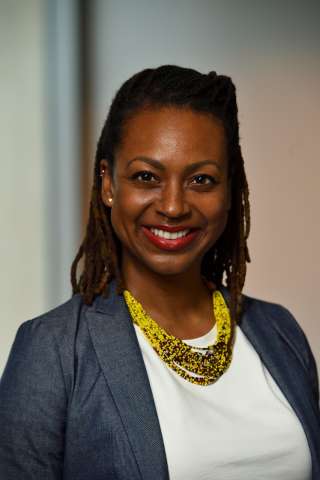
A Healthy, Safe Life for Every Child: Q&A with Bloomberg Fellow Sadiqa Kendi
June 18, 2020
Sadiqa Kendi grew up in south Georgia, a child of two lawyers who moved to the area to join the post-civil rights movement. She decided to study engineering at Spelman College, a historically black liberal arts college for women in Atlanta. But after shadowing a physician during a summer research program, Sadiqa says, she discovered her calling.
“My parents were activists in a way through their legal work. I also had that strong desire to make a difference,” she says. “Even though I never wanted to be a lawyer, becoming a physician would give me that ability to become an activist while also caring for people and forming strong connections.”
Now a pediatric emergency physician-scientist at Children’s National Health System in Washington, D.C., Sadiqa’s research focuses on preventing injuries, the top killer of children in the U.S. While much of her work has centered on behavioral change in individuals, she says, saving even more lives will require changes at a higher level. As a Bloomberg Fellow, her focus is on the built environment—how structural changes in the environment, such as access to safe sidewalks and crosswalks—can prevent injuries and accidental deaths in children.
We spoke with Sadiqa about her passion for protecting children through injury prevention and how the Bloomberg Fellowship can further her work.
What drives you, and how did this bring you to your interest in public health?
I am driven by the desire to make life better for the most vulnerable—for children, for people with limited resources, and for people who are disproportionately affected by societal ills like racism and bigotry. I became a pediatric emergency physician for this reason. The Emergency Department is a safety net for everyone. We see and treat whoever walks through the door. However, I found that I was unsatisfied with helping one patient at a time. It felt like there was more work to be done, and I knew that I could do more to impact larger populations as a public health professional.
What public-health related work have you done that you’re most proud of?
I’m most proud of work I’m doing now to start a Safety Center in southeast Washington, D.C. Wards 7 and 8, which are located in southeast D.C., have the highest levels of poverty, infant mortality, and rates of injuries in the District. When families don’t have a lot of resources, getting safety equipment such as bike helmets and baby gates can be a challenge. I am currently working to lay the groundwork to start a center that will provide injury prevention equipment to families in the area. Our goal is to provide this equipment for free if we have enough grant funding, or at cost when we don’t, which is still a significant savings compared to what families would pay at a big box store. With each piece of equipment, we’ll also provide education to make sure families understand how to use it properly.
What question or problem in your community keeps you up at night?
The question that keeps me up at night is how to work towards every child having a chance to live a healthy, safe life.
How is the Bloomberg Fellows Program helping you to tackle that problem? What impact do you hope you to make as a Bloomberg Fellow?
The Bloomberg Fellows Program is helping me to identify ways that I can make a difference on the population level. It is completely focused on impact, which is the reason I decided to pursue my MPH in the first place. I am in the environmental focus area with many colleagues who are not physicians. I have enjoyed interacting with other fellows who are also interested in making an impact but are doing it in different ways and are looking at the problem through a different lens than the one I am accustomed to using. It has been incredibly enriching and motivating for me.
Tell us something surprising or unexpected about yourself or your work.
I was raised as a vegetarian, but I became a vegan six years ago. I’m a breast cancer survivor, and I went vegan during my treatment initially for personal health reasons. Now I have many more reasons that all center around health and the environment.
Connect With Us
Receive all the latest news from the Initiative by signing up for the American Health Dispatch newsletter, subscribing to the American Health Podcast, and subscribing to our YouTube channel.
Contact Us